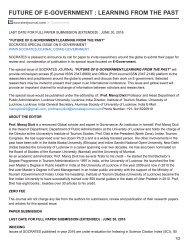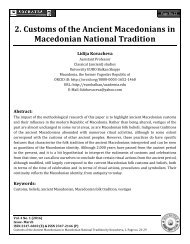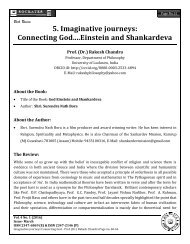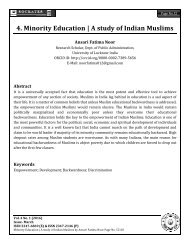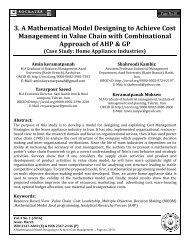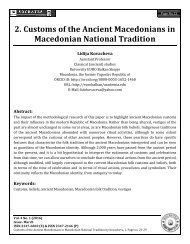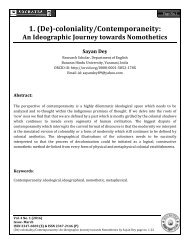(De)-coloniality/Contemporaneity: An Ideographic Journey towards Nomothetics.
Sayan, D. (2016). (De)-coloniality/Contemporaneity: An Ideographic Journey towards Nomothetics. S O C R A T E S, 4(1), 1-22. Retrieved from http://socratesjournal.com/index.php/socrates/article/view/199
Sayan, D. (2016). (De)-coloniality/Contemporaneity: An Ideographic Journey towards Nomothetics. S O C R A T E S, 4(1), 1-22. Retrieved from http://socratesjournal.com/index.php/socrates/article/view/199
You also want an ePaper? Increase the reach of your titles
YUMPU automatically turns print PDFs into web optimized ePapers that Google loves.
Page No.4<br />
enunciated within discussions or debates it is the image of the west that psychologically invades our<br />
mind. The west can be dissected into two broad sections the one that existed before Second World<br />
War and the one that exists after it.<br />
Utopia is the product of the west that existed prior to the world wars and it is this global<br />
minority which has designed its own colonial programs. If we have to intervene into the current<br />
fashion of contemporaneity we have to meticulously analyze how one continent waved its entire<br />
control over the globe and there comes the issue of modernity/<strong>coloniality</strong> research programs.<br />
According to me, modernity is a legitimizing process through which pseudo-structures of existence<br />
are blanketed in the shroud of a virtual realism through a continuous process of expropriation and<br />
appropriation in all the fields of human epistemology. Often the post-colonial scholars nostalgically<br />
look behind <strong>towards</strong> harnessing utopian dreams of achieving perfection which masquerades the<br />
perceptions of master-slave slave relationships through the frequent uses of terms like ‘liberty’, ‘equality’,<br />
‘freedom’ which are immediately juxtaposed with the ideologues of speaking in favor of exploitative<br />
notions that propagated colonialism in disguise.<br />
So, as I was speaking of dissecting the west into two major sections, the West with capital ‘W’<br />
flourished very much after the Renaissance during which voyages in different parts of the world was<br />
financed by the church for the invading and discovering new lands. The mission under<br />
‘modernization’ undertook its flight when Germany, Spain and Portugal turned <strong>towards</strong> the Americas<br />
for the sake of exploring the nature and civilizing its natives. The discovery of the continent of Latin<br />
America instigated a new world order which never existed prior to their invasion where the invaders<br />
very soon realized the promising trading possibilities of the place which will surely benefit the<br />
European minority. The present scenario in Latin America is not much different. It is still the<br />
‘Western’ European dominators and their Euro-North American descendants are still the principal<br />
beneficiaries together with the non-European part of the world.<br />
Usually the perspective of modernization is being represented through the lens of capitalism<br />
and commercialism which have an objective representation. But the very impulse of its beginning<br />
commences through psychological manipulation and it can only commence through the system of<br />
languaging or the process of executing language. Eminent Chilean biologist Humberto Maturana in<br />
his book The Tree of Knowledge uses the perceptions of neurons and the human body functioning<br />
system <strong>towards</strong> the development and functioning of the epistemic system of modernity. According to<br />
Maturana the human society functions as the system of organism and its niches. The niches are the<br />
like interconnected neurons crisscrossing rossing with each other but their joints are distinctly visible. The<br />
epistemic violence unleashed by the Europeans evacuated these distinctive spots in the name of<br />
unity in diversity and ultimately they were all framed within universal superstructures<br />
Vol. 4 No. 1 (2016)<br />
Issue- March<br />
ISSN 2347-6869 (E) & ISSN 2347-2146 (P)<br />
(<strong>De</strong>)-<strong>coloniality</strong>/<strong>Contemporaneity</strong>: <strong>An</strong> <strong>Ideographic</strong> <strong>Journey</strong> <strong>towards</strong> <strong>Nomothetics</strong> by Sayan <strong>De</strong>y page no. 1-22




